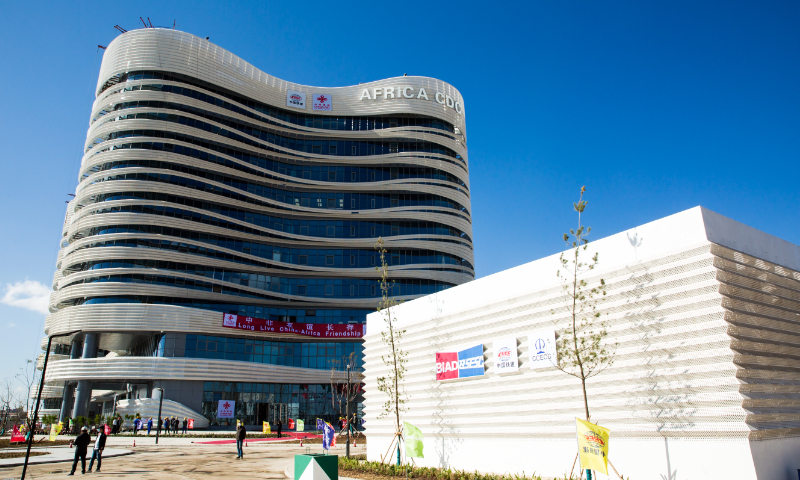China-Africa health cooperation boosted by launch of Africa CDC

The first phase of the headquarters of the Africa Centers for Disease Control and Prevention (Africa CDC) was opened on January 11 during the visit of the new Chinese Foreign Minister, Qin Gang in Ethiopia. Gang is on five-country tour in Africa, which started in Ethiopia, and will cover Benin, Angola, Gabon and Egypt as well as the Africa Union (AU) and the League of Arab States headquarters “to deepen the China-Africa comprehensive strategic and cooperative partnership and boost friendly cooperation.”
The event was also attended by the Chairperson of the African Union Commission, Moussa Faki Mahamat, including other Ethiopian and Chinese officials and dignitaries. Constructed by the China Civil Engineering Construction Corporation, Africa CDC has a gross floor space of 23,570 m2 consisting of administrative offices, emergency response center, information center and biological laboratories. The US$80 million complex is constructed, furnished and equipped by the Government of China.
The center aims at enhancing the continent’s disease prevention and monitoring competence, respond faster to epidemic emergencies, and fortify its public health system and capacity, delivering tangible benefits to the African people. A specialised technical institution of the AU, Africa CDC was established to support public health initiatives of Member States and strengthen the capacity of their public health institutions to detect, prevent, control and respond quickly and effectively to disease threats.
The Chinese government pledged to support the construction of Africa CDC at the 2018 Beijing Summit and the 7th Ministerial Conference of the Forum on China – Africa Cooperation held in Beijing. The AU Commission and the Ministry of Commerce of the People`s Republic of China signed the Implementation Agreement on the Africa CDC headquarters in July 2020.
For centuries, Africans have been afflicted by disease and poor health. In the last century, millions of Africans died from pandemics like malaria, HIV and AIDS, tuberculosis, and cancer, among other communicable and non-communicable ailments. According a May/June 2019 report by the World Health Organization (WHO) titled, “A Heavy Burden: The Productivity Cost of Illness in Africa”, nearly 630 million years of healthy life are lost each year in Africa diseases, costing the continent’s economies about USD 2.4 trillion.
Non-communicable diseases, infectious and parasitic diseases, and neonatal conditions contribute over half of Africa’s disease burden, at 37.12 per cent, 27.11 per cent, and 11.64 per cent, respectively. In its recommendations, the 2019 WHO report states that “implementing the recommended essential health services to address the main causes of morbidity and premature mortality in the region would almost halve this cost”.
In a WHO Africa Office meeting held in Brazzaville, Congo, in September 2017, health research experts noted that universal health coverage in the continent cannot be achieved without evidence from research to develop the necessary technology, systems and services to fully exploit existing tools.
Assembled members of the African Advisory Committee on Health Research and Development noted that, there is a “huge need for research evidence on the causes of ill-health in different settings, the necessary health services, and the high double burden of communicable and non-communicable diseases.”
Early this month, acting director of the Africa CDC, Ahmed Ogwell, told Xinhua that despite being a young organisation, Africa CDC has been able to respond effectively to various outbreaks, including recurrent Ebola outbreaks and the COVID-19 pandemic.
He said Africa and China have worked quite well during the COVID-19 pandemic in ensuring that information is flowing well between the two sides. “We have worked very well securing, particularly, test kits at the beginning of the pandemic, and as we built our own capacity locally, Chinese counterparts were very supportive when things were very difficult in starting our pandemic response on the continent.”
The idea for establishing an African CDC was mooted in July 2013 at the AU Special Summit on HIV and AIDS, TB, and Malaria held in Lagos, Nigeria. This took even more significance and urgency during the 2014 Ebola crisis in West Africa.
Critically, there is need to complete additional research from ongoing trials for a malaria vaccine, and coming up with a cure for HIV. According to WHO, the estimated number of malaria deaths stood at 405,000 in 2018, while 32 million people have died from HIV since the beginning of the epidemic in the early 1980s.
Africa is in dire need of quality and affordable medicines for its massive population, half of who live in poverty. Many of the current medications sold and prescribed in the continent are researched from overseas, ignoring the peculiar dietary and environmental circumstances in the tropics.
Africa CDC can be the driver of positive public health outcomes and solutions for the continent. Moreover, the initiative can serve as an example to be replicated in other places throughout the developing world.








